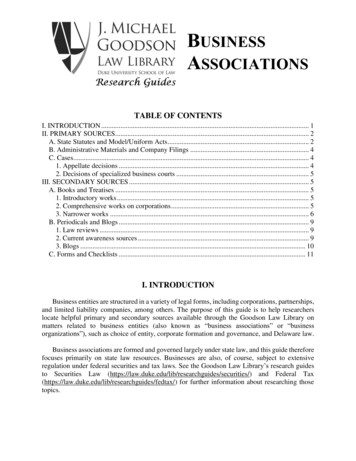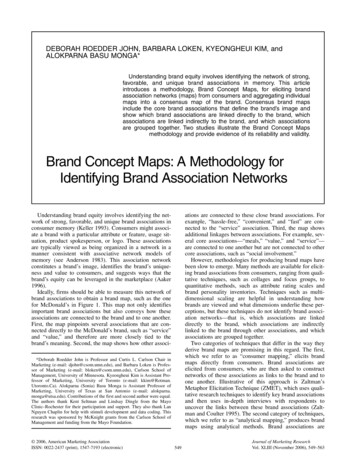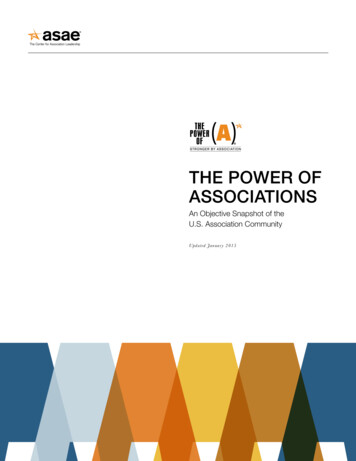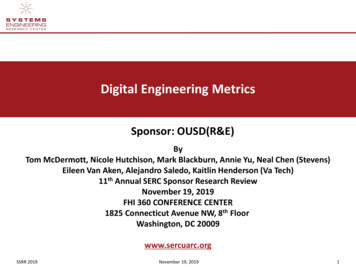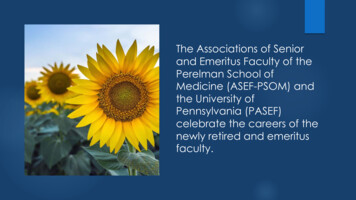
Transcription
The Associations of Seniorand Emeritus Faculty of thePerelman School ofMedicine (ASEF-PSOM) andthe University ofPennsylvania (PASEF)celebrate the careers of thenewly retired and emeritusfaculty.
Gordon H Baltuch, MD, PhD, FACS, FRCS(C)NeurosurgeryPerelman School of MedicineDr. Baltuch has retired as a professor from Penn tobecome the co-chief of the Division of FunctionalNeurosurgery and Professor of Neurosurgery at ColumbiaUniversity Vagelos College of Physicians and Surgeonsand Columbia University Irving Medical Center/New YorkPresbyterian. Dr. Baltuch specializes in the surgicaltreatment of movement disorders and was one of the firstneurosurgeons in the US to use deep brain stimulation toreduce tremor and other motor symptoms in people withParkinson’s disease and other movement disorders.
Richard D. Bellah, MD, FAAPRadiologyPerelman School of MedicineDr. Bellah was a radiologist and Director of the Division ofUltrasound and Student Programs at CHOP. His clinicalexpertise is in general pediatric radiology, genitourinary(GU) radiology, and ultrasound imaging. He received hisBS in Biology from Tulane University of Louisiana, and hisMD from the Medical University of South Carolina. Heperformed residencies in diagnostic radiology, pediatricsand pediatric radiology. His fellowship in radiology wasperformed at the Boston Children's Hospital, Boston.
Christine Bradway, PhD, RN, FAAN, AGSFBiobehavioral and Health SciencesSchool of NursingThroughout her career, Dr. Bradway integratedevidence-based care, scholarship, teaching, andservice to optimize care for older adults. At Penn Nursingshe developed and directed an academic practice forfrail community-dwelling older adults (the ContinenceProgram, 1988-2000). Awards include Fellowship in theAmerican Academy of Nursing and American GeriatricsSociety, the Barbara Lowery Doctoral StudentOrganization Faculty Award and the Norma LangDistinguished Award for Scholarly Practice and Policy.
Marcia S. Brose, MD, PhDOtorhinolaryngologyPerelman School of MedicineDr. Brose has retired as an Associate Professor of headand neck surgery to become a professor at JeffersonUniversity and Chief of Cancer Services at JeffersonTorresdale Hospital and Medical Co-Director ofCommunity Clinical Research. While at Penn she hasbeen the Director of the Thyroid Cancer TherapeuticsProgram and the Director of the Center for Rare Cancersand Personalized Therapy. Her research focuses on thecorrelative aspects of clinical trials where she has been aleader in identifying genetic markers of responses inclinical trials.
Lesley Carson, MDGeriatric DivisionPerelman School of MedicineDr. Carson has spent almost forty years deliveringmedical care to the mostly geriatric population inPhiladelphia and educating those who plan to carry onthis effort. She has seen patients in sites including theoffice, hospital, long term care facility, and home, andhas tried to facilitate their transitions from one to another.Her aim has been to encourage understanding andinvolvement in one’s own health by partnering with thepatient but also by means of a collaboration withmultiple other health care providers.
Russell P. Carstens, MDMedicinePerelman School of MedicineDr. Carstens’ clinical expertise is in nephrology. Hereceived his BA from Johns Hopkins University and his MDfrom Yale University School of Medicine. His researchinterests are in the study of the molecular mechanisms ofalternative splicing and how this is regulated by theepithelial-specific splicing factors Esrp1 and Esrp2 duringdevelopment and disease. He also studies the regulationof genome-wide changes in splicing during the epithelialmesenchymal transition (EMT).
Melpo Christofidou-Solomidou, PhDMedicinePerelman School of MedicineDr. Christofidou-Solomidou’s research focuses onpulmonary inflammation and cell adhesion moleculeregulation and expression. She helped developoxidant-induced acute and chronic lung injury animalmodels for the study of diseases such as ARDS, sepsis,radiation-induced pneumonitis/fibrosis, and oxygentoxicity. Specific projects focused on the developmentof antioxidant methodologies for the targeting ofantioxidant enzymes to the pulmonary endotheliumusing antibodies and the use of dietary alternativeantioxidant agents in ameliorating acute and chronicoxidative lung disease.
Paul Crits-Christoph, PhDPsychiatryPerelman School of MedicineDr. Crits-Christoph was a recipient of 22 NIH grants asPrincipal Investigator to study the process and outcomeof psychosocial treatments for depression, anxiety, andsubstance use disorders. He has published over 300peer-reviewed articles/chapters/books. Dr. CritsChristoph has served as President of the Society forPsychotherapy Research (SPR), received theDistinguished Career Award from SPR, and received theDistinguished Scientific Contributions to ClinicalPsychology from the American PsychologicalAssociation, Division 12.
William P. Dailey, PhDChemistrySchool of Arts and SciencesDr. Dailey has published research work in strained-ringorganic compounds, organo-fluorine molecules, andcomputational and matrix-isolation chemistry. Morerecently he has developed and synthesized a series ofinhalation and intravenous anesthetic photoaffinitylabels that have been used to probe the mechanism ofaction of commonly used anesthetics. He was awardedan Alfred P. Sloan Research Fellowship in 1990 and aLindback Award for Distinguished Teaching at theUniversity of Pennsylvania in 1992.
Cynthia Damon, BA, MA, PhDClassical StudiesSchool of Arts and SciencesDr. Damon’s research has kept fairly consistently to thegeneral theme of how writing communicates, pursuing italong different lines and in a variety of texts both Latinand Greek. For the past two decades her focus hasbeen Roman historical narrative but coming projects willcenter on Pliny's encyclopedic Natural History and itsreception. Teaching and working with students hasbeen a privilege and pleasure.
Michael X. Delli Carpini, PhDAnnenberg School for CommunicationDr. Delli Carpini’s research explores the role of thecitizen in democratic politics with particular emphasison the impact of mass media on public opinion, publicdeliberation, political knowledge, and politicalparticipation. He was awarded the 2008 MurrayEdelman Distinguished Career Award from theAmerican Political Science Association and elected asa Fellow of the International CommunicationAssociation in 2018. He served as Dean of theAnnenberg School for Communication from 2003-2018.
Francis J. DeRoos, MD, MEdEmergency MedicinePerelman School of MedicineDr. DeRoos is an Associate Professor of EmergencyMedicine at the Hospital of the University ofPennsylvania and the Residency Program Director forthe Department of Emergency Medicine in thePerelman School of Medicine. His clinical expertise istoxicology, and he is a medical toxicologist in thePoison Control Center at the Children's Hospital ofPhiladelphia. He received his MD and residency trainingin Emergency Medicine from UCLA and was a Fellow inClinical Toxicology at the New York City Poison Center.
Julie A. Fairman, PhD, RN, FAANBiobehavioral Health SciencesSchool of NursingDr. Fairman's research focuses on 20th centuryhealthcare issues, in particular the history of healthpolicy as it relates to scope of practice and servicemodels, and the history of technology. Her recent workexamines the intersection of civil rights and health care.Her work has been funded by the NLM, NEH, and theRWJ Foundation Investigator in Health Policy Program.In 2011 she was the first historian inducted into theSigma Theta Tau Research Hall of Fame. She recentlywas awarded a Rockefeller Bellagio Academic WritingFellowship for 2022.
Harold I. Feldman, MD, MSCECenter for Clinical Epidemiology and BiostatisticsPerelman School of MedicineDr. Feldman, the George S. Pepper Professor of PublicHealth and Preventive Medicine and Professor ofEpidemiology and Medicine, dedicated his 35 years atPenn to all facets of nephrology as educator, clinician,and internationally renowned researcher leading thenation’s largest clinical research program in kidneydiseases (the CRIC Study). Dr. Feldman was chair of theDepartment of Biostatistics, Epidemiology, andInformatics, 2012–2019, and Director of the Center forClinical Epidemiology and Biostatistics, 2012–2022.
Lee A. Fleisher, MDAnesthesiology and Critical CarePerelman School of MedicineLee A. Fleisher, MD, was chair of Anesthesiologyand Critical Care at Penn from 2004-2020. Hereceived the Lindback Award in 2016 and waselected to the National Academy of Medicine. Hetook a leave of absence in 2020 to assume therole of Chief Medical Officer and Director of theCenter for Clinical Standards and Quality for theCenters for Medicare and Medicaid Services andplans to continue in that role.
Feng Gai, PhDChemistrySchool of Arts and SciencesDr. Gai’s research focuses on protein folding andconformational dynamics in the context of the structuredynamics-function relationship. His contributions towardscience have been widely recognized: he received theAmerican Chemistry Society Philadelphia Section Award(2014), was named the Edmund J. and Louise W. KahnTerm Professor of Chemistry (2014), elected to Fellow ofthe American Association for the Advancement ofScience (2012), and Fellow of the American PhysicalSociety (2011).
George L. Gerton, PhDObstetrics and GynecologyPerelman School of MedicineDr. Gerton’s research focused on the biochemistry andcell biology of fertilization. Early studies examinedprotein changes in the egg coats caused by oviductalmaturation and fertilization. Subsequently, his laboratoryexamined the biogenesis, structure, and function of thesperm acrosome and flagellum during spermatogenesisand fertilization. From 2019-2020, he served as Presidentof the American Society of Andrology, the nationalorganization dedicated to the science and medicine ofmen’s reproductive health.
Robert M. Greenberg, PhDPathobiologySchool of Veterinary MedicineDr. Greenberg was a member of the Department ofPathobiology. He studied the physiology, host-parasiteinteractions, and molecular biology of parasitichelminths, focusing on schistosomes, and parasiticflatworms that cause schistosomiasis, which affectshundreds of millions worldwide. Previously, he heldpositions at the University of Florida and the MarineBiological Laboratory.
Murray Grossman, MDCM, EdDNeurologyPerelman School of MedicineDr. Grossman’s clinical and research career focusedon early-onset dementias, including sporadic andmutation carriers with frontotemporal dementia. Hisresearch emphasized a precision-medicine approachto the development of multimodal disease biomarkersnecessary for diagnosis and prognosis, including novelclinical, neuroimaging, and biofluid studies validatedthrough gold-standard, clinical-pathologicalcorrelations. His lab trained MD and PhD graduatestudents and fellows. He was recently recognized bythe Society of Behavioral and Cognitive Neurologywith their Lifetime Achievement Award.
Mauro F. Guillén, PhDManagementThe Wharton SchoolDr. Guillén is the Dean of the Judge Business School atthe University of Cambridge, Professor of ManagementStudies, and Professor Emeritus of Management atPenn. He is a former Fulbright and Guggenheim fellow,recipient of the Aspen Institute’s Faculty PioneerAward, and elected member of the SociologicalResearch Association. His latest book, 2030: HowToday’s Biggest Trends Will Collide and Reshape theFuture of Everything, was an instant Wall Street Journalbestseller.
David Harbater, PhDMathematicsSchool of Arts and SciencesDr. Harbater joined the Penn Mathematics Departmentin 1978; his most recent position is as Christopher H.Browne Distinguished Professor in SAS. His researchinvolves connections between algebraic geometryand areas such as number theory and topology. AFellow of the American Mathematical Society, he wonthe American Mathematical Society Cole Prize in 1995for his proof of Abhyankar's conjecture, and in thesame year won a Lindback Award for DistinguishedTeaching.
Elizabeth A. Hembree, PhDPsychiatryPerelman School of MedicineDr. Hembree is an Associate Professor of ClinicalPsychology and an expert in the assessment andevidence-based treatment of individuals with PTSD,anxiety disorders, and OCD. She has primarily focusedon these and on the dissemination of cognitivebehavioral treatment for PTSD. Her expertise in traumaand PTSD benefited the VA and the DOD in trainingmental health workers. She has published numerousarticles and book chapters and co-authored PTSDtherapy manuals published by Oxford University Press.
Ann L. Honebrink, MD, FACOGObstetrics and GynecologyPerelman School of MedicineDr. Honebrink's career in Women's Health has focusedon preventive and menopausal care. She is also activein the American College of Obstetrics and Gynecologyto advocate for colleagues and the women theyserve. She has been a member of the PhiladelphiaMaternal Mortality Review Committee since itsfounding. Teaching the next generation of physicianshas been part of her work, and she served as theOB/GYN Clerkship Director at Penn. Dr. Honebrinkreceived the Sylvan Eisman Outstanding Primary CarePhysician award in 2010.
Richard M. Ingersoll, PhDEducation and SociologyGraduate School of EducationAfter teaching in both public and private high schoolsfor a number of years, Dr. Ingersoll obtained a PhD insociology at Penn in 1992. From 1995 to 2000 he was afaculty member in the Sociology Department at theUniversity of Georgia. In 2000 he came to theGraduate School of Education at Penn and in 2012was appointed Board of Overseers Professor ofEducation and Sociology.
Daniel D. Langleben, MDPsychiatryPerelman School of MedicineDr. Langleben pioneered a technique for usingfunctional magnetic resonance imaging (fMRI) as ameans of lie detection. He has also studied the braineffects of packaging and advertising and how infants'cuteness motivates caretaking in adults. He graduatedfrom the Hebrew University of Jerusalem and HebrewUniversity Hadassah Medical School. He completedresidencies in Psychiatry and Radiology (Mount Sinai)and fellowships in Addiction Psychiatry (UCSF) andNuclear Medicine (Stanford). He is well published andhis work has received extensive media coverage.
David Leatherbarrow, PhDArchitectureWeitzman School of DesignDr. Leatherbarrow is Emeritus Professor of Architecture.He has lectured throughout the world and held guestprofessorships in Britain, Denmark, and China. Questionsof how architecture appears, is perceived, and shapestopography direct his research. The most recent ofLeatherbarrow's twelve books is: Building Time:Architecture, Event, and Experience. In 2020 he wasawarded the Topaz Medallion for Excellence inArchitectural Education by the American Institute ofArchitects/Association of Collegiate Schools ofArchitecture (AIA/ACSA).
Terri Lipman, PhD, CRNP, FAANFamily and Community HealthSchool of NursingDr. Terri Lipman is an internationally recognizedexpert in pediatric diabetes. As a nurse researcher,educator and practitioner, she has beencommitted to partnering with marginalizedcommunities to address racial disparities intreatment and outcomes of children withdiabetes. Her honors and awards include afellowship in the American Academy of Nursing,the Lindback Award for Distinguished Teaching,the Norma Lang Award for Scholarly Practice andPolicy, and a Citation from the Mayor ofPhiladelphia for Service to the Community.
James B. (Sparky) Lok, MS, PhDPathobiologySchool of Veterinary MedicineDr. Lok’s research and teaching focus on parasitesaffecting human and animal health. His researchrevealed molecular signaling pathways regulatingdevelopment of parasitic nematodes andpioneered methods for transgenesis and genomeediting in these organisms. Dr. Lok has receivedthe Lindback Award for Distinguished Teaching(1999), the Norden and Zoetis DistinguishedVeterinary Teacher Awards (1996, 2014), and theAmerican Society of Parasitologists’ Bueding andVon Brand Lectureship (2018).
Amit Maity, MD, PhDRadiation OncologyPerelman School of MedicineDr. Maity was Executive Vice-Chair in the Departmentof Radiation Oncology and the Morton M. KligermanEndowed Professor. His research focuses ondeveloping strategies of improving the radiationresponse, using agents that modify the tumormicroenvironment and alter cellular signaling. Inparticular, he has focused on the PI3K/mTOR pathway,which is upregulated in many human cancers. Hisclinical research focuses on using hypofractionatedradiation to potentiate the action of immunecheckpoint inhibitors in patients with metastatic solidtumors including melanoma, non-small-lung cancer,and breast cancer.
Cary M. Mazer, PhDEnglishSchool of Arts and SciencesDr. Mazer spent most of his 43 years at Penn buildingthe undergraduate major in Theatre Arts, hiringscholar-practitioners who, like him, integrated theoryand practice. He wrote scholarship on Shakespearein performance, directed plays, was a freelancetheatre critic, a professional dramaturg and, morerecently, a playwright. He received the SAS Awardfor Mentoring Undergraduate Research, and his playShylock’s Beard received the Judith Royer Awardfrom ATHE.
Francis X. McGowan Jr., MD, FAAPAnesthesiology and Critical Care MedicinePerelman School of MedicineDr. McGowan was the Greeley Endowed Chair andDirector of Anesthesiology Research, at CHOP,specializing in pediatric anesthesiology. He continues toprovide perioperative medical care and cardiacanesthesiology to both pediatric and adult patients. Hisresearch interests include mechanisms of infantmyocardial injury and protection; mitochondrialmechanisms of myocardial injury; cardiac mitochondrialfunction, damage, and biogenesis; inflammatorymechanisms in ischemia-reperfusion andcardiopulmonary bypass and intravenous oxygendelivery. He received his BA in Biochemistry from BrownUniversity, and his MD from Duke University School ofMedicine.
Judith Green McKenzie, MD, MPH, FACP,FACPM, FACOEMEmergency MedicinePerelman School of MedicineAn epidemiologist trained in both Occupational andEnvironmental Medicine (OEM) and Internal Medicine,Dr. McKenzie received her AB from Princeton, MD fromYale, and MPH from Johns Hopkins. Author of over 130scientific publications, she developed the nation’s firstTrain-in-Place Residency Program. A Penn MasterClinician, she was honored with the InternationalLifetime Kehoe Achievement Award for Excellence inEducation and Research by the American College ofOEM.
Susan Sauvé Meyer, PhDPhilosophySchool of Arts and SciencesA specialist in Greek and Roman philosophy withan emphasis on the ethical tradition, Dr. Meyer haspublished books and articles about Plato, Aristotle,and Stoicism. Her latest book, How to Flourish: AnAncient Guide to Living Well, will be published nextyear by Princeton University Press, and over120,000 people worldwide have enrolled in heropen-access online courses, Plato and hisPredecessors, and Aristotle and his Successors onCoursera.
Surafel Mulugeta, PhDMedicinePerelman School of MedicineDr. Mulugeta is an internationally recognizedinvestigator in pulmonary biology. His research focuseson mechanisms underlying the biogenesis, processing,and function of specific lung proteins in health anddisease. His discovery of the ABCA3 protein in the lungand characterization of several key pulmonarycomponents (including SP-C) are central forunderstanding both normal lung function andpathogenesis, as described in his numerous peerreviewed manuscripts in leading scientific journals andbook chapters.
Burt Ovrut, PhDPhysics and AstronomySchool of Arts and SciencesDr. Ovrut received his PhD from the University ofChicago in 1978 and joined Penn’s Physics Departmentin 1985. Dr. Ovrut is a high energy particle physicist withstrong interests in cosmology. He created the PennMath/Physics Research Group and the internationallyfunded research program, "The Particle Physics andCosmology of Supersymmetry and String Theory." Dr.Ovrut is author or coauthor of 240 journal articles andmore than 200 papers appearing in conferenceproceedings.
Kathy Peiss, PhDHistorySchool of Arts and SciencesDr. Peiss has explored the history of modernAmerican culture, gender and sexuality, consumerculture, and the history of books, libraries, andinformation. She is a Guggenheim Fellow andmember of the Society of American Historians. Sheserved as department chair in History from 2008 to2011 and received the Ira H. Abrams Award (2013)and Richard S. Dunn Award (2021) fordistinguished teaching.
Michael V. Pimsner, PhDMathematicsSchool of Arts and SciencesDr. Pimsner received his PhD in 1984 from theInstitute of Mathematics of the RomanianAcademy (INCREST, Bucharest) and has beenProfessor of Mathematics at Penn since 1991. He isan Honorary Member of the Institute ofMathematics of the Romanian Academy ofSciences. Dr. Pimsner is best known for his seminalwork on operator algebras.
Thomas J. Power, PhD, ABPPPediatricsPerelman School of MedicineDr. Power was a Professor of School Psychology inPediatrics at CHOP. He received his BS in Psychologyfrom St. Joseph’s College, his MA in guidance andcounseling from Villanova, and his PhD in Psychology inEducation from Penn. His research interests are in theassessment and treatment of ADHD, multisystemicinterventions for children with ADHD, behavioral healthin primary care, and developing interventions for thesedisorders. His clinical expertise is in group parent trainingand consulting with schools on managing andpreventing health problems.
Guthrie Ramsey, PhDMusicSchool of Arts and SciencesDr. Ramsey received this year’s GuggenheimFellowship. A member of the American Academy ofArts and Sciences and widely published in musichistory, he is the founding editor of Musiqology.com,hosts The MusiQology Podcast, and MusiQology Rx, hiscommunity arts initiative for underserved communities.As a producer, label head, and leader of the band, Dr.Guy’s MusiQology, he performs across the nation. Hehas produced and scored several documentaries andmusic videos.
Shelley C. Rankin, PhDMicrobiologySchool of Veterinary MedicineDr. Rankin received a BSc in 1988 and a PhD fromthe University of Glasgow in 1996. She joined thePenn School of Veterinary Medicine in 1999 whereshe became Head of Diagnostic Services andProfessor and Chief of Clinical Microbiology in 2018.Her research has focused on the intersection ofanimal and human diseases, recently thetransmission of SARS-Cov-2 between pets and theirowners. In 2021 she became Global Director ofMicrobiology and Molecular Diagnostics at ZoetisLaboratories.
Dean W. Richardson, AB, DVM, DACVSClinical Studies-New Bolton CenterSchool of Veterinary MedicineDr. Richardson is Charles W. Raker Professor of EquineSurgery and Chief of Large Animal Surgery in the Schoolof Veterinary Medicine. He received an AB fromDartmouth College in 1974, a DVM from Ohio State in1979, and was named a Diplomate of American Collegeof Veterinary Surgeons in 1982. He has receivednumerous academic awards and honors from theequine community. Dr. Richardson’s efforts to saveKentucky Derby winner Barbaro, injured in the 2006Preakness Stakes, were publicized globally.
David D. Sherry, MDPediatricsPerelman School of MedicineDr. Sherry avoided an undergraduate degree but gotan MD from Texas Tech, did pediatrics at Duke, andpediatric rheumatology at the University of BritishColumbia. He has authored over 200 papers andchapters. He received multiple teaching awards(including Blockley-Osler), clinician awards, and theAmerican College of Rheumatology Master Award.He has a special interest in amplified pain in children.He has five children, ten grandchildren, and a wife of49 years.
Robert G. Smith, PhDNeurosciencePerelman School of MedicineDr. Smith has been a research scientist studyinghow the neural circuits of the retina process visualinformation. He has published studies on contrast,color, night-time vision, single photon vision, andcomputation of direction. He developed acomputer simulation language, Neuron-C, thatallows investigators to perform experiments onbiophysically realistic models of retinalmicrocircuits and to test hypotheses about theirfunction.
Rogers M. Smith, PhDPolitical ScienceSchool of Arts and SciencesDr. Smith has been Christopher H. Browne DistinguishedProfessor of Political Science at Penn since 2001 after 21years teaching at Yale. His many publications includeCivic Ideals, a 1998 Pulitzer Prize Finalist. Smith has beenPenn’s Associate Dean for Social Sciences andPresident of the American Political Science Association.He was founding director of the Penn Democracy,Citizenship and Constitutionalism Program, theforerunner of the Andrea Mitchell Center, and cofounder of the Teachers Institute of Philadelphia. Hereceived five teaching prizes from Penn and Yale.
Robert St. GeorgeHistorySchool of Arts and SciencesDr. St. George is Associate Professor of History. Hejoined the faculty at Penn in 1989. His researchexplores ethnographic method, folklife studies,material culture, vernacular landscapes, andheritage productions. His most recent bookis Possible Pasts: Becoming Colonial in EarlyAmerica (2000). A past winner of the LindbackAward for Distinguished Teaching (1999), he hasheld fellowships from many sources including theNational Endowment for the Humanities.
C. Dana Tomlin, PhDLandscape ArchitectureWeitzman School of DesignDr. Tomlin has long worked as a researcher,author, educator, and practitioner in the field ofgeographic information systems (GIS). At Penn, heco-founded Cartographic Modeling Lab, receivedthe Lindback and Perkins teaching awards, andplayed a central role in establishing the Master ofUrban Spatial Analytics degree program. He hasalso held faculty positions at Harvard, Ohio State,and Yale, where he continues to serve as anAdjunct Professor.
Frederick B. Vivino, MD, MS, FACRMedicinePerelman School of MedicineDr. Vivino was the Director of the Penn Sjögren’sSyndrome Center, the Chief of Rheumatology at PennPresbyterian, and a Professor of Clinical Medicine. Hedirected one of the country’s largest Sjögren’s centersand has abundant clinical and research experiencewith this patient group. He was a co-investigator in theSjögren’s International Collaborative Clinical Alliancetissue registry. Recently, he oversaw the first phasedevelopment and publication of the Sjögren’sFoundation’s clinical practice guidelines for the oral,ocular, and rheumatologic manifestations of thedisease.
Thomas A. Wadden, PhDPsychiatryPerelman School of MedicineSince 1981 Dr. Wadden has conducted NIH-fundedresearch to improve the lives of people with obesity —through lifestyle modification, pharmacotherapy, andbariatric surgery — work resulting in 500 publicationsand seven books. He directed Penn's Center for Weightand Eating Disorders from 1993-2017. His honors includethe Arthur Asbury Outstanding Faculty Mentor Award(2007) and the Thomas Wadden Award for DistinguishedMentorship, established by his students and presentedannually at the Obesity Society meeting.
Yan Yuan, PhDBasic & Translational SciencesSchool of Dental MedicineYan Yuan received a BSc degree from ShandongUniversity in 1982, an MSc from Academia Sinica in 1985,and a PhD from the Baylor College of Medicine in 1991.He was a postdoctoral fellow at Yale before joining theDepartment of Basic and Translational Sciences of thePenn School of Dental Medicine in 1996. Dr. Yuan’sresearch focuses on biology and pathogenicity ofKarposi’s sarcoma-associated herpes virus (KSHV), themost common malignancy in AIDS patients.
Theoklis Zaoutis, MD, PhD, MSCEPediatricsPerelman School of MedicineDr. Zaoutis is a leader in the field of pediatric infectiousdiseases. He is active in public health and policy in theUS and Europe and has served as a consultant to theWHO, the NIH, the CDC, and the AAP among otherinstitutions. He has a robust research program focusedon the epidemiology, prevention, and treatment ofhealthcare-acquired infections, antimicrobialresistance, and antimicrobial use. He served as Professorof Pediatrics and Epidemiology at PSOM and as Chief ofthe Division of Pediatric Infectious Diseases at CHOP.
Penn Association of Senior andEmeritus Faculty upenn.eduAssociation of Senior and EmeritusFaculty of the Perelman School ofMedicine (ASEF-PSOM)https://www.med.upenn.edu/asef
the University of Pennsylvania (PASEF) celebrate the careers of the newly retired and emeritus . positions at the University of Florida and the Marine Biological Laboratory. Murray Grossman, MDCM, EdD Neurology Perelman School of Medicine Dr. Grossman's clinical and research career focused on early-onset dementias, including sporadic and .



